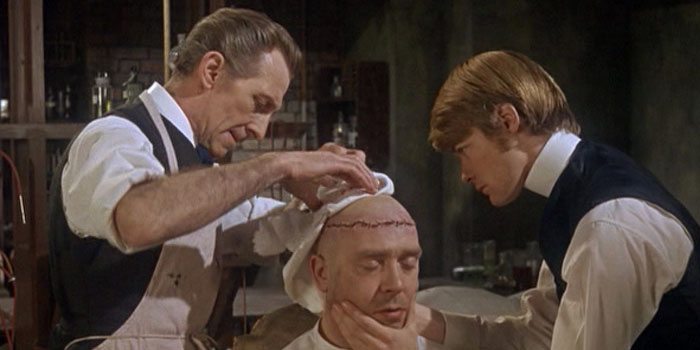![]()
Frankenstein Must Be Destroyed (1969) Directed by Terence Fisher
An exploitation Frankenstein movie, that’s what it is. However, it is uninspired exploitation that neither director Terence Fisher and his actors felt very comfortable working with. Hammer produces this fifth entry in its, until before this installment, consistently solid series of films about Baron Frankenstein. This is not a good one. It is dubious, sexist and incongruous, the most superfluous hodgepodge of nonsensical shock intended to justify a banal, very poorly written script with gratuitous sensationalism and mythological distortion of the character of Victor Frankenstein. Watching this film leaves you with a perpetual feeling of helplessness; it is practically submitting you to witness not Frankenstein Must Be Destroyed, but Frankenstein is Destroyed – as a character, as a concept, and as a man of science. Hammer’s Frankenstein, whom Peter Cushing actorly gave him an identity and a signature personality, is here vulgarly thrown overboard and engenders anything but the Frankenstein that Cushing with so much dedication and diligence gave life, madness and passion. And, although I have no concrete evidence of this, I get the impression that Cushing doesn’t feel at ease playing Frankenstein in this film. Why? Because the Frankenstein in Bert Batt’s script is not Frankenstein!
The early Frankenstein films established Dr. Frankenstein as an iconoclastic, God-defying scientist, a tenacious man of science capable of using the most unorthodox methods to satisfy his most far-reaching experiments. Therefore, he is an amoral fellow. His insanity prevents him from distinguishing good from evil because his scientific pursuits are at the top of his moral hierarchy. The Frankenstein of this fifth sequel is blatantly immoral. One of the most profound aspects of the character that Cushing meticulously wrought prior to this film is the empathy that Dr. Frankenstein elicits in us despite his cruelty and violent zeal to consummate his experiments. Here the empathetic factor does not reach any climactic note because there is none. The Frankenstein that Cushing works with here is a guy who enjoys doing evil more than pursuing his ambitious scientific dreams. Cushing is working with what Hammer provides, and frankly what they provide is rubbish. Just remove the name Frankenstein from the story and you wouldn’t even know you were watching a Frankenstein movie. But if you’re still not convinced, just wait until you read the synopsis.
Dr. Frankenstein (Peter Cushing) has been hard at work on heretical experiments with the genius Dr. Frederick Brandt (George Pravda), who has discovered a groundbreaking formula. Frankenstein wants this knowledge, but Dr. Brandt is confined in a psychiatric hospital – he is completely demented, he doesn’t even know who he is. Frankenstein’s plan is to transfer Dr. Brandt’s brain into a new body in order to cure him of his insanity and extract information about his miraculous discovery. To accomplish this, Dr. Frankenstein viciously blackmails a young couple of lovers, Anna (Veronica Carlson) and Karl (Simon Ward), into helping him kidnap Dr. Brandt. One would assume that the most logical narrative approach to developing this plot on the big screen would be to give Frankenstein more plausible motives to carry out all this illicit action, and one would also think that the most coherent thing to do would be to give priority to Frankenstein’s dangerous ambitions, but no, the whole damn movie strives to portray a nefarious, bullying Victor Frankenstein.
Simply put, the whole movie is about Frankenstein blackmailing a pair of young lovers in the most pathetic and despicable way. Many viewers have pointed out the biggest flaw in Frankenstein Must Be Destroyed, namely the stupid and pointless scene of Frankenstein raping Anna. The scene is not bad in its entirety – after all there is a good director behind the scenes masterminding the mise-en-scene – what is cheap and sloppy about that infamous scene is that it serves no purpose whatsoever. Even the trashiest rape-revenge genre exploitation films justify the use of the barbaric act of sexual abuse in order to give meaning to the cathartic comeuppance. Here the rape simply happens. In the subsequent acts it is never mentioned again. Any follower of the great character that is Doctor Frankenstein, whether they are fans of Mary Shelley’s Frankenstein or Colin Clive’s, knows that Frankenstein would never rape a woman, that is so anti Frankenstein that the preposterous existence of that scene is a chimera.
It’s a real bummer that at the behest of some of Hammer’s executive producers they had to throw away the sensuous and evocative style that Terence Fisher crafts in this film only to succumb to the exploitative proclivities of the time. It is unduly long and pointlessly overdramatic. There are sections of glorious gothic glamour, cinematic sleekness and British horror film finesse, but these lose their touch when you testify to the annihilation of Frankenstein’s folklore.

